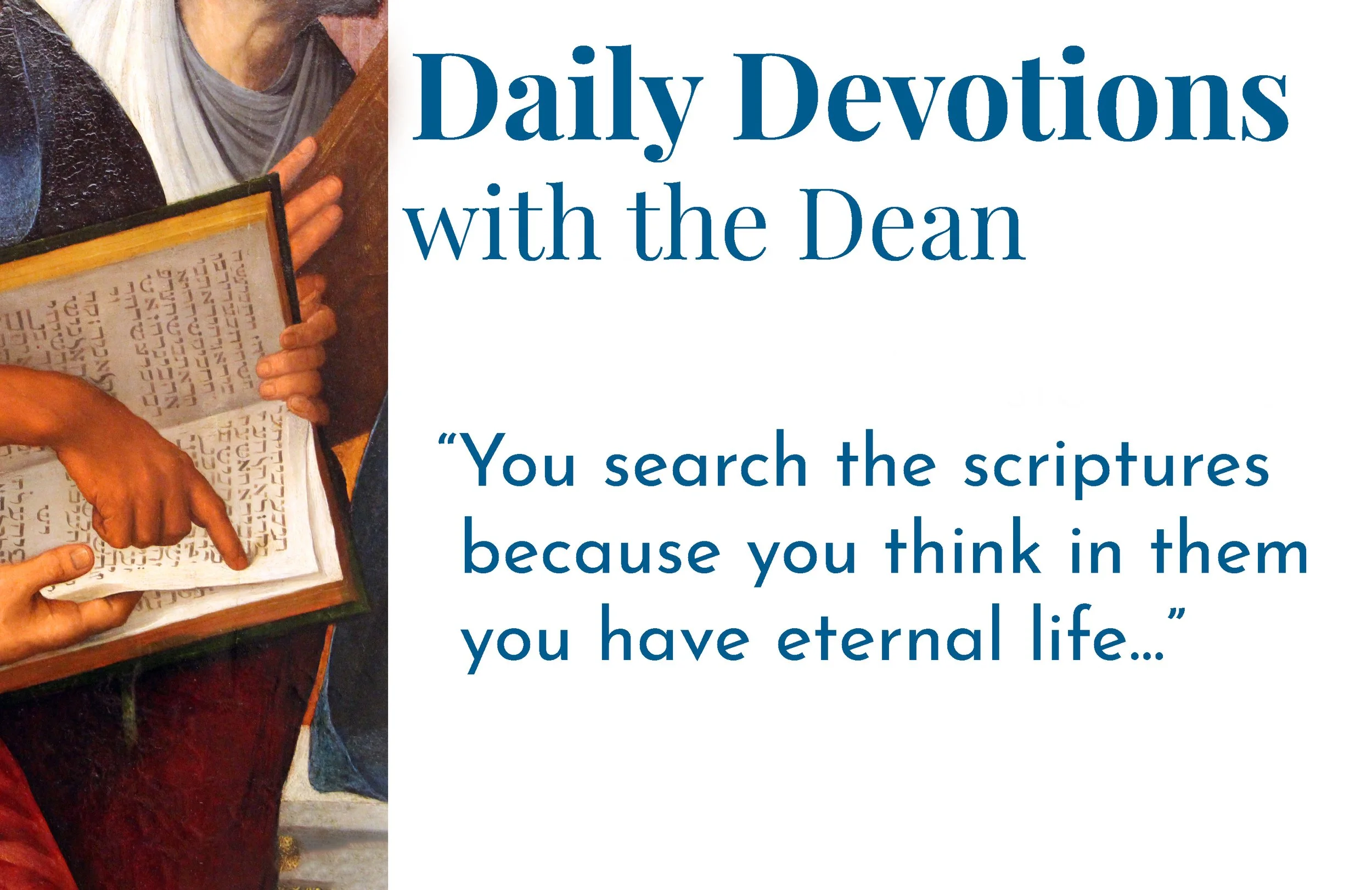Tuesday • 8/16/2022
This morning’s Scriptures are: Psalm 121; Psalm 122; Psalm 123; Judges 18:1-15; Acts 8:1-13; John 5:30-47
This morning’s Canticles are: following the OT reading, Canticle 13 (“A Song of Praise,” BCP, p. 90); following the Epistle reading, Canticle 18 (“A Song to the Lamb,” Revelation 4:11; 5:9-10, 13, BCP, p. 93)
An audio or video version of this devotional can be found here: Apple Podcast, Spotify Podcast, YouTube
Psalm 122. Today’s Psalm 122 extols the “peace of Jerusalem” secured by “thrones of the house of David.” This city “at unity with itself” and enjoying “quietness within your towers” stands in marked contrast to the situation today’s Judges passage describes from an earlier era when “In those days there was no king in Israel” (Judges 18:1).
Judges. Under Joshua after the conquest, the tribe of Dan had been assigned land in Judah to the south. Somehow, in a way that is never explained, “the territory of the Danites was lost to them” (Joshua 19:47). Judges 18 recounts how their search for a new home brings them north. They employ the same spying techniques Israel had used against the Canaanites; only now, their target—shamefully!—is their fellow Israelites. To make matters worse, recognizing a fellow southerner’s accent in the voice of yesterday’s “Levite-for-hire,” they secure a blessing supposedly from the Lord. Seeing the prospect of a better deal than Micah’s family had offered and the prospect of a “bigger steeple” for his ministerial services, the Levite tells the Danites what they want to hear: “Go in peace. The mission you are on is under the eye of the Lord” (Judges 18:6).
Acts 8. It is only fitting that today’s passage in Acts provides cameos of two religious leaders who initially react to Jesus in opposite ways, and who will have equally contrasting ends. Saul (whom we will get to know better by his Roman name Paul) rages against Christ and his church—later he will become (to steal a moniker from historical fiction writer Taylor Caldwell) a “great lion of God” precisely on behalf of Christ and his church. Simon the sorcerer, by contrast, believes Philip’s preaching about Jesus at first, and is baptized. Being something of a religious celebrity himself, he attaches himself to Philip and is amazed at the signs and miracles that take place in the name of Christ. Only later (in tomorrow’s reading) will we find why the sin of “simony” (that is, “turning a profit from sacred things”) is named after him.
John 5. “I can do nothing on my own. As I hear, I judge; and my judgment is just, because I seek to do not my own will but the will of him who sent me” — John 5:30. It’s remarkable that the Lord of the wind and the waves, the one who raises the dead to life and restores sight to the blind, has this one limitation: “I can do nothing on my own.” Jesus’s words unmask the self-serving spirit of the “Levite-for-hire” in Judges and of Simon the sorcerer.
“… but I say these things so that you may be saved.” — John 5:34. The “Levite-for-hire” and Simon the Sorcerer will speak to benefit themselves. Jesus speaks for the benefit of his hearers, even when what he says is not what they want to hear.
“You search the scriptures because you think that in them you have eternal life; and it is they that testify on my behalf … If you believed Moses, you would believe me, for he wrote about me … I know that you do not have the love of God in you.” — John 5:39, 46. Scripture itself can be misleading if it is read without the dual lens of: 1) attentiveness to the voice of the promised Redeemer; and 2) an eagerness to learn of God’s love and to return his love with one’s own love. Jesus’s words cut through the fog of Saul’s blinding rage: he had failed to understand (as he was later to discover) that every word of Holy Scripture had been pointing to the coming of Jesus Christ, and that with Christ’s coming the love of God would be “poured out in our hearts by the Holy Spirit” (Romans 5:5).
These seem to be strong takeaways for today: 1) live under Yahweh’s authority, not my own; 2) look for Christ’s saving purposes everywhere; and 3) let love be more and more my heart’s basic drive.
Be blessed this day,
Reggie Kidd+
Image: Sailko, CC BY 3.0, via Wikimedia Commons


